Washington State makes progress to end FGM/C
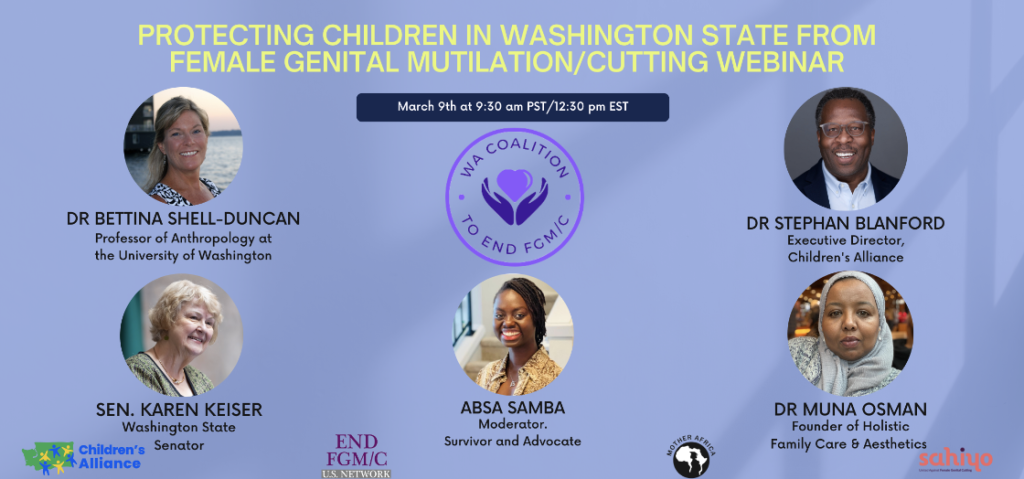
Washington State is one of the remaining ten U.S. states without any law that addresses and prohibits female genial mutilation/cutting (FGM/C). FGM/C is a human rights violation and form of child abuse and gender-based violence that involves removal of the female genitalia for non-medical purposes. This gap in state protection has left children in Washington vulnerable to this harmful practice. In fact, an estimated 25,000 women and girls in Washington are living with or at risk of undergoing FGM/C. The Seattle-Tacoma-Bellevue metro area is considered the 5th highest metro area in the U.S. in terms of the size of the FGM/C-affected community. In 2019, a change.org petition that gained 170,000+ signatures was started to address this lack of protection for children. “Washington state is #18 for gender equality by US News and World Report. Gender Equality should be a priority in Washington state. Social, political, and economic equality and equity is limited when we don’t have the full participation of all of our women and girls. Harmful customs or social norms that contribute to GBV (gender-based violence) including FGM/C in addition to costing lifelong pain and suffering can hold women, girls, and others who have undergone FGM/C back from full participation.” ~ Absa Samba The Washington Coalition to End FGM/C was created to educate people in the state about the need for policy solutions to address FGM/C. The coalition is made up of survivors, community organizations, legislators, advocates, and others. On March 9th the Washington Coalition to End FGM/C held a webinar in partnership with Sahiyo, The U.S. End FGM/C Network, Children’s Alliance, and Mother Africa to help shed light on how FGM/C impacts those living in Washington state, and to discuss policy level solutions, community-based programs, and education initiatives needed to protect women, girls, and others from undergoing this harmful practice. Speakers included: Absa Samba, a student, activist, and survivor of FGM/C who helped found the Coalition and made contact with Washington Senators to sponsor a bill against FGM/C, Bettina Shell Duncan, a Professor of Anthropology at the University of Washington in Seattle who has done extensive research on FGM/C, Stephan Blanford, the Executive Director of Children’s Alliance, Muna Osman, Doctorate Prepared Nurse Practitioner, founder of holistic family care clinic, a co-founder of mama amaan research team, and survivor, Senator Karen Keiser (D-WA 33), sponsor of SB 5453, a bill that will make FGM/C illegal in Washington State. Speakers helped to shed light on the issue of FGM/C by discussing what it was, who it impacts, and most importantly, that it does affect residents of Washington. The vital need for policy to end FGM/C amongst future generations of children was also discussed. “The pressure to undergo FGM can be intense for girls and their families…the solution is to coordinate change in families and communities so that people are not acting in isolation. If everybody can agree to abandon the practice, the negative sanctions can be lifted…When other members of the community are given the power of law to strengthen their position, the law becomes a powerful tool for enhancing their power to persuade others that this is a practice that’s no longer relevant in this context and in this time.” ~ Bettina Shell Duncan, panelist The coalition has supported policy work by working on the passage of Washington Senate Bill 5453. This bill, informed by the Washington Coalition to End FGM/C, has been championed by state Senator Karen Keiser and, if passed, will prohibit FGM/C on minors, creates a civil cause of action for survivors of FGM/C, and establishes an education program to prevent FGM/C in Washington. “This education component of this bill is huge for our [Somali] community. I think this bill coming from us, for us, by us, to help the community, I think it is a beautiful thing. I am confident that the community will accept it.” ~ Muna Osman, panelist During the event, audience members were also called to action to support the bill by signing onto an action alert. As of March 29, Senate Bill 5453 has passed the Washington state Senate unanimously and is making its way through the House of Representatives. Similar legislation was introduced in the Washington legislature in 2019 but it did not pass; a key difference between the two campaigns is that this year in 2023, the bill is backed by a strong coalition of directly-impacted survivors, advocates, community members, health practitioners, human rights activists, policymakers, faith based groups, and other allies. Whereas in 2019, there was a lack of inclusion of FGC impacted communities who lived in Washington in the crafting of the legislation. The unanimous support from legislators this year is a strong indication that Washington state will become the 41st state to pass a law to prohibit and prevent FGM/C.
Reflecting on There’s an App For That?: Technological Innovation and Change Towards Ending Female Genital Cutting event
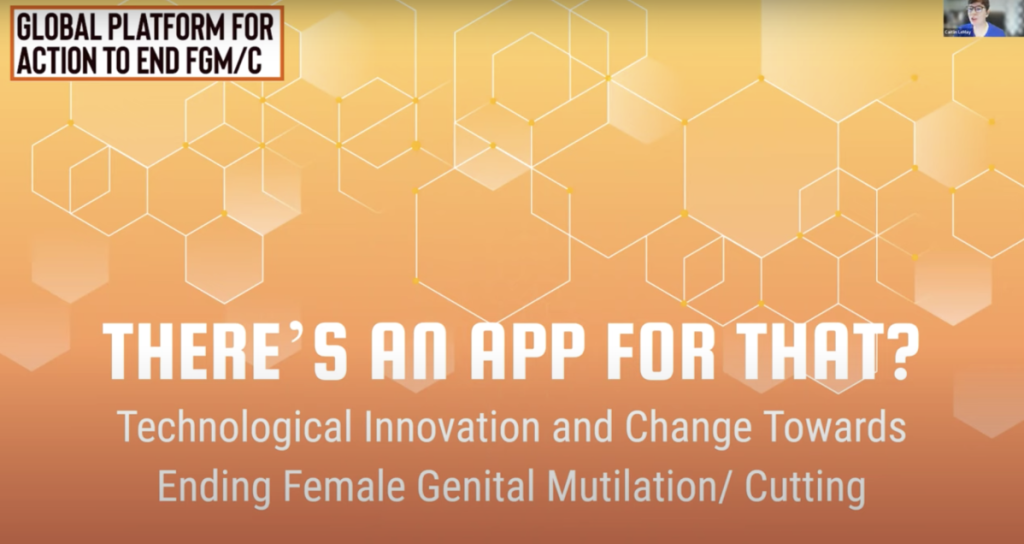
By Derrick Simiyu During this past March 8th, International Women’s Day, I was extremely excited to attend There’s an App For That? Technological Innovation and Change Towards Ending Female Genital Cutting, hosted by the Global Platform for Action to End FGM/C as a parallel event during the United Nations’ NGOCSW67. The webinar explored how technology, internet communication, and the digitalization of awareness raising can help support the elimination of female genital cutting (FGC). The event’s moderators were Caitlin LeMay of The U.S. End FGM/C Network and Esmael Omar of Amref Health Africa. Speakers for the webinar were leading innovators addressing FGC through technological solutions. The first was Priya Goswami, a Sahiyo Co-founder who has used her background in filmmaking and storytelling to create awareness about the harmful effects of FGC. She also created an app called Mumkin, the Bohra Gujarati word for ‘possible’. The aim of Mumkin was to provide a platform for engaging in difficult conversations around sensitive topics, such as FGC, domestic violence, and consent in relationships. Priya discussed how Mumkin creates a safe digital space where one can freely speak out without fear of coercement. While the app’s features are ethically improved through ongoing research, the safety of the app is of particular significance to the innovators. Mumkin is all about the difficult conversations needed to discover answers to ongoing challenges. The next speaker was Myriam Mhamedi, a lead communications and campaigns strategist for the End FGM EU Network. Myriam is in charge of implementing the Network’s awareness-raising and communication for advocacy initiatives. She discussed how End FGM EU was formed, which is an umbrella network of approximately 35 different organizations working to ensure a joint European action to end FGC. The presentation by Myriam Mhamedi stood out for me as she showed a network map of Europe that depicts the status of FGC in the different European countries. It is an awesome map that shows law, policy, data and training resources concerning FGC. According to the map, around 600,000 women are living with the consequences of FGC in Europe. It was surprising to me that FGC exists in Europe and has occurred in Europe for a long time; one may falsely think it is only done in Africa and does not happen in other places around the world. Another innovator was Purity Christine Achieng, a software developer in mobile application development. She co-directed the creation of the iCut app, which allows young women to seek medical and legal aid before or after forcibly undergoing FGC. i-Cut allows users to choose from five main options: help, rescue, report, information on FGC, and donate and feedback. iCut also provides a platform where victims can directly dial emergency numbers for FGC call centers and other pertinent helplines. Purity Christine explained how the app helps educate the general public about the harmful effects of FGC. She further stated that the use of technology to eliminate FGC is essential because it connects survivors quickly to organizations that can support them on their healing journey associated with FGC. I downloaded the iCut app, and quickly noticed the rescue centers, which I felt fulfilled the requirements of an FGC rescue app. The design was also amiable, in my opinion, making the experience enjoyable as well as informative. Julie Debois, a UNICEF child protection specialist, was the last speaker on the panel. She developed the Pasha app, which acts as both a responsive and a preventative tool that provides critical information about FGC. I found it very simple to download the Pasha app from the Google Play Store. I think the app is very user-friendly, and I appreciated the special function that allows users to report emergencies involving FGC anonymously if they happen to have no time for signing in. The innovators also spoke to the challenges they underwent in the process of launching and maintaining their technological tools. The panelist shared that even with these technological tools, there is a challenge via a lack of knowledge in FGC impacted communities that these technologies even exist. One key takeaway from the event for me was the need to incorporate and use technology in working to end FGC. It is a need that cannot be ignored. Through the use of technology, a bigger percentage of FGC impacted communities can be reached and we can move that much closer to ending FGC globally.
Washington Coalition hosts educational webinar on female genital cutting

On March 9th, the Washington Coalition to End FGM/C, in partnership with Sahiyo, The U.S. End FGM/C Network, Children’s Alliance, and Mother Africa, held a webinar called Protecting Children in Washington State from Female Genital Mutilation/Cutting with the goal of drawing attention to this human rights violation and how it impacts children in the State. The webinar was also held to highlight the need for Senate Bill 5453, which would make female genital cutting (FGC) illegal in the state, provide civil remedies for survivors, and call on education programs on FGC to be created. A 2016 study by the Population Reference Bureau estimated that 25,000 girls and women in Washington State are living with or at risk of undergoing FGC. The study also ranked the Seattle-Tacoma-Bellevue metro area as the 5th highest metro area in terms of size of the FGC-affected community in the U.S. The webinar hosted a panel discussion in which speakers Absa Samba and Muna Osman shared their personal experiences with FGC as survivors and activists working to end the practice. Researcher Bettina Shell-Duncan discussed how research supports the need for legislation to change social norms around communities believing that FGC had to continue for the good of the child. Finally, Stephan Blanford, Executive Director of the Children’s Alliance highlighted how the state has seen other sharmful ocial norms regarding children change through policy in the state and how he is confident the same could be said if a law on FGC were created. Watch the recording of the webinar here: [youtube url=”https://www.youtube.com/watch?v=pZEefGBUTzQ”]
Moving Connecticut ahead: Protecting girls from Female Genital Mutilation/Cutting
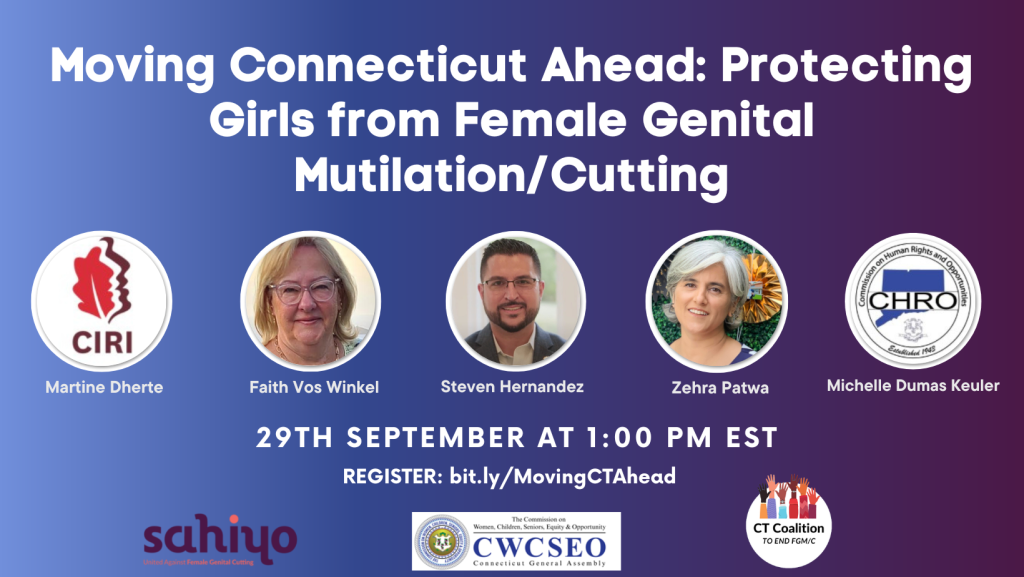
Date: Sep 29, 2022 Time: 1 PM to 2:30 PM EST (90 mins) Registration Link: bit.ly/MovingCTAhead In partnership with the Connecticut Commission on Women, Children, Seniors, Equity and Opportunity and The Connecticut Coalition to End Female Genital Mutilation/Cutting (FGM/C), Sahiyo will be hosting “Moving Connecticut Ahead: Protecting Girls FGM/C. In 2013, the Population Reference Bureau estimated that 2,658 women and girls in Connecticut (CT) were at risk of undergoing – or having already undergone – female genital mutilation/cutting (FGM/C). FGM/C is a harmful social norm practiced worldwide and the United Nations has declared it a human rights violation. In Connecticut, many other human rights violations stemming from social norms have been addressed through legislation such as human trafficking, child marriage, and conversion therapy. However, Connecticut has yet to address the issue of FGM/C and remains one of 10 U.S. states without any state-level law protecting future generations from this harm. This webinar will explore how Connecticut can move forward to address this issue through legislation to better protect its women and girls from FGM/C. Get to know the panel! Moderator: Steven Hernández Steven Hernández, Esq Executive Director CT Commission on Women, Children, Seniors, Equity and Opportunity CT General Assembly Steven Hernández, Esq. is the Executive Director of the CT Commission on Women, Children, Seniors, Equity and Opportunity, a non-partisan agency of the Connecticut General Assembly. At the Commission, Mr. Hernández serves as the legislative lead for the State’s 2GEN initiative, an approach that puts family at the center of improved community outcomes, and as drivers of long-term economic success. Mr. Hernández proudly serves on several volunteer boards and commissions rooted in public service. He previously served the CT state legislature as Director of Public Policy and Research for the Connecticut Commission on Children. Prior to joining the Commission, Mr. Hernández served seven years as legislative and budget director in the office of Washington, D.C., Council member Jim Graham. Mr. Hernández served as a clerk to two judges in the District’s Court of Appeals and as a consultant to the Washington law firm Baker & Miller, PLLC. He received a Bachelor of Arts Degree from Bennington College in Vermont in 1995 and a Juris Doctor Degree from the Washington College of Law at American University. Speakers: Zehra Patwa Zehra Patwa is the Co-Founder and US Lead of WeSpeakOut, an organization that strives to work for equal rights for Bohra women in all spheres of life, specifically, on Female Genital Mutilation/Cutting (FGM/C) or khafz. She grew up in London and was educated at the University of Bradford Management Centre in the UK and the Université de Montpellier in France. Zehra serves on several Boards, including Integrated Refugee and Immigrant Services (IRIS), and currently serves as Vice-Chair of the Sahiyo US Advisory Board. After discovering well into adulthood, that khatna or khafz (type 1 FGM/C) was practiced in her community and that she, too, had been subjected to it, she decided she could no longer keep silent. Although she has no recollection of the practice being done to her, she is vehemently opposed to it and has been working with WeSpeakOut to expose the practice within, and outside, the community. She currently works in Digital Customer Delivery for the Knights of Columbus in New Haven, Connecticut. Faith Vos Winkel Before Faith’s recent retirement from Government, Faith Vos Winkel began her work with the Office of the Child Advocate in July 2001 and assists the Child Advocate to fulfill her statutory mandates including overseeing the systems of care and protection for children in Connecticut and advocating for their well-being. Faith’s primary responsibilities focus on the review of all unexpected and unexplained child deaths in Connecticut. She is responsible for preparing child fatality cases and conducting comprehensive investigations. Faith represents the Child Advocate on a variety of statewide policy committees including the Suicide Advisory Board, CT Coalition Against Domestic Violence Fatality Review Committee, and the Governor’s Task Force on Justice for Abused Children. Ms. Vos Winkel has an undergraduate degree from the University of Connecticut and a Masters of Social Work from the University Of Connecticut. Martine Dherte Martine Dherteis the Program Manager for refugee services at the Connecticut Institute for Refugees and Immigrants. She uses her platform to educate newly arrived refugees resettled by her organization in Bridgeport. She would like her programs, which currently includes GBV services to address FGM and become a stronger advocate in the field. She is passionate about protecting women and girls from all forms of abuse. Michelle Dumas Keuler Michelle Dumas Keuler is the Managing Director of the Housing, Training and Appeals divisions of the Legal Division and Commission Counsel with the State of Connecticut Commission on Human Rights and Opportunities (“CHRO”). Founded in 1943, the CHRO is the nation’s oldest state based civil rights organization. The Commission is charged with investigating and prosecuting cases of employment, housing, public accommodation and credit discrimination. As a Managing Director, Ms. Dumas Keuler represents the agency in its prosecution of employment, housing and public accommodation discrimination cases before agency Human Rights Referees, in state court, and federal court. Ms. Dumas Keuler has extensive experience training in the areas of housing, employment and public accommodation discrimination, employer best practices and sexual harassment discrimination. She has trained countless landlords, tenants, housing authorities, state and municipal employees and employers regarding discrimination statutes and their enforcement by the CHRO. Ms. Dumas Keuler also works on policy for the Commission and is active in promoting the legislative initiatives of the agency.
Moving Connecticut ahead: Protecting girls from FGM/C

Date: Thursday, September 29, 2022 Time: 1:00 PM EST Registration Link: bit.ly/MovingCTAhead This webinar, sponsored by Sahiyo, The Connecticut Coalition to End Female Genital Mutilation/Cutting, and the Connecticut Commission on the Status of Women, Children, Seniors, Equity and Opportunity, will explore ideas on how to change harmful social norms like female genital mutilation/cutting (FGM/C) through policy and legal methods. 40 other states have passed legal protections to address this harmful practice, yet Connecticut remains an outlier. The panelists for this event include Zehra Patwa, Co-Founder of WeSpeakOut, Michelle Dumas Keuler, Human Rights Attorney with the State of Connecticut Commission on Human Rights and Opportunities, and Faith Vos Winkel, who was formerly at the Office of the Child Advocate. The webinar will be moderated by Steven Hernandez, Executive Director for the Commission on Women, Children, Seniors, Equity, and Opportunity.
An Emergency Within an Emergency: The Crises of Climate Change and Female Genital Cutting
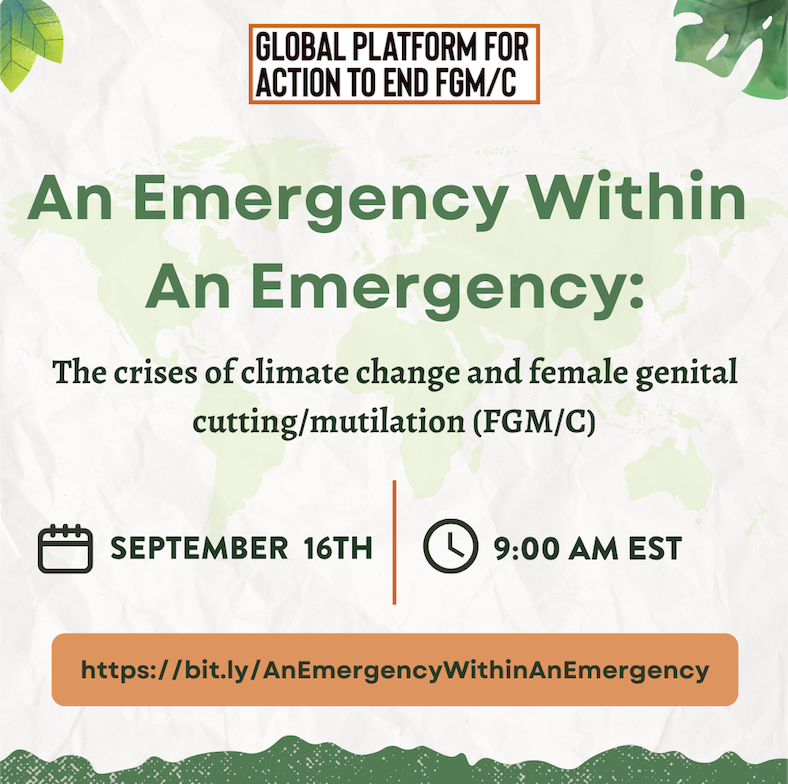
Date: September 16th, 2022 Time: 9 am EST Register here today: https://bit.ly/AnEmergencyWithinAnEmergency It is an understood global reality that women and girls are facing the harshest impacts of climate change, and activists across the world continue to fight for the inclusion of women and girls in climate change mitigation and adaptation strategies. Yet, too little is being done to address the multitude of ways in which climate change disproportionately impacts women and girls. One of the common, but often overlooked, impacts of climate change is on female genital mutilation/cutting (FGM/C). Defined by the WHO as any procedure that involves the removal of the external female genitalia for non-medical reasons, FGM/C is internationally recognized as a human rights violation. For many girls across the globe, climate change has only served to make them more vulnerable to this form of harm. Join the Global Platform for Action to End FGM/C on September 16th at 9 am EST as we explore the impact of climate change on female genital mutilation/cutting and hear from the activists themselves who are working to uplift girls in their communities about what can be done. For this event, we will be joined by world-famous activists Eva Komba and Domtila Chesang alongside award-winning journalist Neha Wadekar as they explore their work and experience with this growing issue. This panel will also be moderated by Sahiyo co-founder and passionate activist against FGM/C Mariya Taher. Mariya Taher has worked in gender-based violence for over a decade in the areas of teaching, research, policy, program development, and direct service. In 2018, Mariya received the Human Rights Storytellers Award from the Muslim American Leadership Alliance. In 2020, she was recognized as one of the six inaugural grant recipients for the Crave Foundation for Women. Since 2015, she has collaborated with the Massachusetts Women’s Bar Association to pass legislation to protect girls from FGC. After starting a Change.org petition and gathering over 400,000 signatures, Massachusetts became the 39th state in the U.S. to do so. She also sits on the steering committee for the US End FGM/C Network. As of 2021, Mariya serves as an expert consultant for the Department Of Justice Addressing Female Genital Mutilation/Cutting technical assistance project. Eva Komba is an experienced development professional in the area of international gender and development expert with 10 years of experience. She has major competencies in matters of Public Policy Formulation and Research, Access to gender justice, Sex and Gender Based Violence Programming and Implementation, Ending Harmful Traditional Practises and Combating Trafficking of Women and Girls in Africa. She is also skilled in the area of Monitoring and Evaluation, Gender Responsive Budgeting, Gender Mainstreaming as well as Women Empowerment. Domtila Chesang is a champion fighting to end FGM, child marriage and other harmful cultural practices. She has been advocating for girls and women’s rights since 2014 through various initiatives. As a full time women’s rights advocate, she founded the I_Rep Foundation, which is a community based organization that she uses as a vehicle to create awareness around these issues and provides platforms at the community levels for learning and dialogue. Because of her fearless campaigns and passion for girls and women’s rights protection and empowerment in her community, she has received a number of recognitions both locally and internationally. In 2017, she was among three Kenyans to receive the prestigious Queens Young Leaders Award presented by the Queen of England in Buckingham Palace. In 2018, she was recognized as the African Youth Leader of the year. She was nominated as the Human Rights Defender of the year in 2019. She is also a founding member of the African Women’s Rights Advocate. Neha Wadekar is an independent multimedia journalist reporting across the globe. She reports at the intersections of climate, gender, conflict, health, human rights, emerging democracies, and politics. Neha’s written and video work has been published in The New York Times, The Washington Post, The New Yorker, The Atlantic, The Wall Street Journal, The Economist, PBS NewsHour, the Los Angeles Times, The Guardian, Mother Jones, CNN, and others. She has received fellowships from the Pulitzer Center for Crisis Reporting, the United Nations Foundation, the Fuller Project, the Overseas Press Club, the International Women’s Media Foundation, and the Groundtruth Project.
Reflecting on A Quiet Violence: Navigating Female Genital Cutting as an LGBTQ+ Survivor

By Trisha Kini On June 23rd, Sahiyo hosted their webinar A Quiet Violence: Navigating Female Genital Cutting as an LGBTQ+ Survivor in honor of LGBTQ+ pride month. The event was moderated by Sahiyo U.S. Advisory Board chair, internal medicine physician, and chief medical editor of EverydayHealth.com Dr. Arefa Cassoobhoy. Panelists included poet, playwright, filmmaker, and producer Dena Igusti (they/them), End FGC Singapore volunteer Afiqa (she/they), lawyer, activist, and writer Umme Kulsoon Arif (she/they), and pelvic and gynecologic surgeon Dr. Marci Bowers (she/her). Oftentimes, LGBTQ+ and non-binary survivors of FGC are underrepresented and silenced in FGC activism, statistics, academic literature, and healthcare settings. Health organizations and anti-FGC advocacy movements frequently use gender binary terms when referring to FGC survivors, further propagating the harmful idea that FGC only impacts women. Panelists who identified as non-binary FGC survivors, Dena, Afiqa, and Umme, all shared stories of their own journey in understanding sexuality and gender as survivors of FGC, along with the harms of a false assumption that every survivor of FGC identifies as a woman. While it is true that FGC impacts those assigned female at birth, not all survivors identify with being a woman, womanhood, and heteronormative culture. Ascribing cisgender-heterosexual labels and expectations to non-binary survivors not only dismisses one’s identity and personhood, but also negatively impacts a survivor’s mental and physical health. Members of the panel advocated for the needs of unheard LGBTQ+ survivors, and raised awareness about steps anti-FGC organizations can take to be more inclusive, respectful, and welcoming to survivors of all gender identities. The event began with two powerful videos from our 2022 Voices to End FGM/C cohort, which were recently released to the public. Dena Igusti’s On being a Nonbinary Survivor of FGM/C highlighted that the use of non-inclusive language and terminology in FGC-related statistics has led them to question whether their experiences can be validated as a gender non-conforming individual. This was followed by Afiqa’s eye-opening video Conversations with my Mother, which shared their experience of learning about FGC as a young girl. Afiqa often questioned why circumcision was celebrated for men versus women, and as they continued to question FGC and heterosexual norms, they realized their reality of gender and sexuality did not match what society demanded of them. The lack of LGBTQ+ inclusive resources available in healthcare settings, therapy, and anti-FGC organizations has actively limited the amount of care non-binary FGC survivors can benefit from. Dena, Afiqa, and Umme often found they had to create their own language for themselves, as their experiences were not considered in the resources sought for their own healing. They also found that their experiences were often downplayed by society through invalidation and ignorance. Following this discussion, Dr. Bowers stressed the importance of gender affirming care, which refers to medical interventions that support an individual’s gender identity. With anti-FGC bills in Texas and Idaho that prohibit gender affirming care, healthcare as a right has been denied to trans individuals, which further deters LGBTQ+ individuals from seeking care. This has put LGBTQ+ youth at risk of facing wider health complications and neglect from the system. In addition, the reversal of Roe V. Wade has turned back the clock and denied rights to bodily autonomy. Trans people, just like cis people, deserve the right to safe spaces for healthcare, gender affirming care, and the right to choose what happens with their bodies. The webinar ended on an important note: how allies can be supportive of LGBTQ+ survivors. Some of the many steps we can take as allies are as easy as amplifying voices, even if it just means adding your pronouns to your social media, or making public statements showing solidarity, such as “trans rights are human rights.” In terms of anti-FGC initiatives, it is essential to actively make an effort to utilize gender inclusive language and include non-binary folks, rather than restricting FGC to a woman’s issue. This applies to medical care as well. Healthcare providers can actively stand with their LGBTQ+ patients by implementing inclusivity in intake forms, wearing pronoun buttons, unlearning assumptions, educating each other, and making an effort to meet the patient where they are, thereby cultivating an open-minded and respectful environment. One of the big takeaways I gathered from this webinar is the harmful impact of assuming one’s experience with gender-based violence (GBV). Not all LGBTQ+ survivors of GBV share similar experiences, as these are also shaped by intersectional factors such as culture, value, and religion, among others. In order to make an effort to understand one’s experience with survivorship, asking questions, showing support, and speaking up can make all the difference in helping LGBTQ+ survivors feel safe and welcomed. LGBTQ+ individuals, like cisgender, heterosexual ones, are well within their rights to expect respect, healthcare, and inclusion in order to facilitate their own healing and growth. Watch the webinar here. Read the transcript from the webinar here.
Reflection on Sahiyo webinar: Understanding Social Norms to end Female Genital Cutting
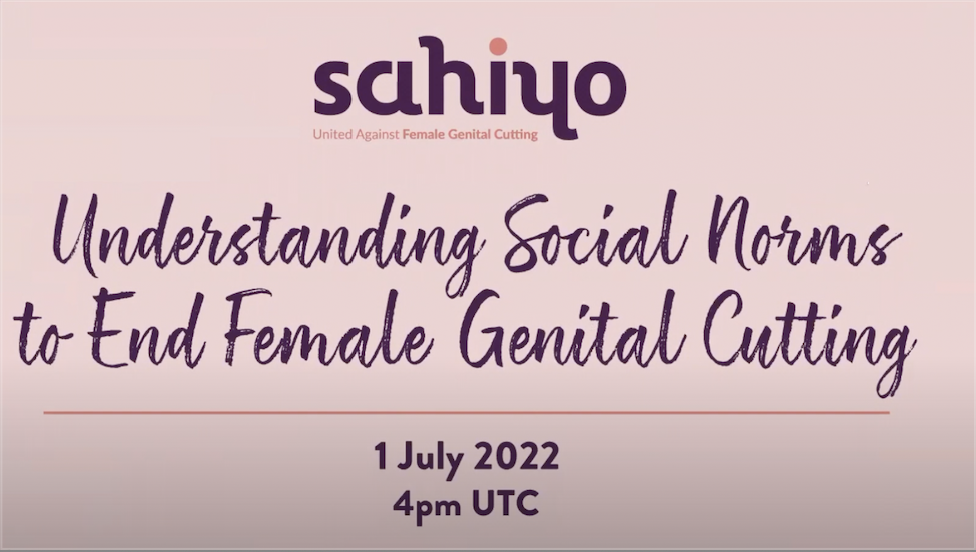
By Trisha Kini Sahiyo hosted the webinar Understanding Social Norms to End Female Genital Cutting on July 1st. The event was moderated by Sahiyo co-founder, and winner of the Chameli Devi Jain Award Aarefa Johari, and attended by distinguished guest speakers Molly Melching and Maryan Abdikadir. Maryan is a survivor and activist of female genital mutilation/cutting (FGM/C), who contributed to the Prohibition of FGM Bill in Kenya. She also participated in our 2022 Spring Voices to End FGM/C workshop. Molly Melching is the founder and creative director of Tostan, an NGO whose mission is to empower African communities by fostering and promoting community engagement in literacy, health, and human rights projects. Social norms are a growing set of unwritten rules and standards, which are passed on generationally in communities and cultures. These norms are often indisputably followed by society, as they are viewed as “the right thing to do” or dismissed with the notion of “this is how it is and should be.” FGC, although prohibited in many countries, continues to be practiced as a social norm wherein young girls, women, and those assigned female at birth (AFABs) are raised with the expectation that they must undergo the practice without having the autonomy to choose for themselves. Molly beautifully presented the three main factors to consider when classifying an action as a social norm: a reciprocal expectation within a reference group, which refers to the community of people the norms affect; positive and negative sanctions if the norm is followed versus not followed; and finally, value attached to the practice. The webinar began with Maryan’s moving and powerful Voices to End FGM/C video The Verbal Cut. Maryan shared her story of learning and unpacking FGC as a social norm and described learning that FGC has no basis in Islam and is not followed by all Muslim women. Amongst many other myths, she was told that if she does not undergo the procedure, her prayers will not be accepted in her faith. When she understood that FGC is not beneficial to women, and that these false beliefs were passed on to keep the practice in place, she decided against it for her daughter. Her daughter was shamed, ridiculed, and questioned for not undergoing FGC. Maryan’s video highlighted that even if some women decide to not follow the practice, this decision can still hurt them, which aligns with the norm that women’s value in practicing communities is determined by whether she is cut or not. FGC continues in so many communities due to the social norms that perpetuate it. As an outsider that does not belong to the community, Molly explained how informing people about the consequences of FGC in a non-judgemental, respectful manner can be very effective in facilitating conversations about abandoning the practice as a community. As part of Tostan’s human rights program, FGC survivors who have abandoned the practice approach leaders of practicing communities and facilitate conversation about the harmful health impacts of FGC. Following weeks to months of deliberation through community engagement, the community makes a final declaration. A considerate and respectful approach when talking about FGC may sound like using preferred terminology, such as “cutting’’ instead of “mutilation’’. Using vocabulary with harmful implications can be discouraging as words like “mutilation” can imply an intent to harm. However, Maryan, who belongs to the Somali community, prefers to use the term mutilation as she believes this term describes her experience with the practice. As outsiders, it is important to be aware of preferred terms when referring to FGC in order to accommodate and respect community and survivor experiences. As part of Molly’s activism, she continues to demystify myths associated with FGC, and terms considered taboo in order to facilitate effective conversations. Some countries, like the US, have named FGC as a punishable offense and a violation of the law, while some countries are yet to acknowledge FGC as punishable. Maryan and Molly agreed that the law helps as a fallback option, but also believe that it is barely a solution. However, Molly maintained that the law is often mentioned in conversation by survivors who abandoned the practice. This is helpful, as it provides a strong argument for both why the practice needs to be abandoned, and why there is a reason for laws against FGC. While it helps back up FGC as a harmful practice, education and community engagement are some of the most important approaches to ending FGC and dismantling it as a social norm. This webinar helped me understand how social norms can range from the simplest of societal expectations to life threatening consequences. Unwritten rules are ingrained so rigidly in society that it is difficult to notice them around us. This especially came to mind when Maryan mentioned she would have never thought to question FGC without finding out that her friend did not undergo the practice. It opened my eyes to silent norms present in communities around the world, which have the power to continue cycles of oppression in race and gender as we see today. It is important for us as a society to question harmful social norms and how we can shift them in a manner that uplifts voices around us to eventually break these cycles. Watch the webinar here. Read the webinar transcript here.
Notre Webinaire À Venir: Comprendre les normes sociales pour mettre fin aux mutilations génitales féminines
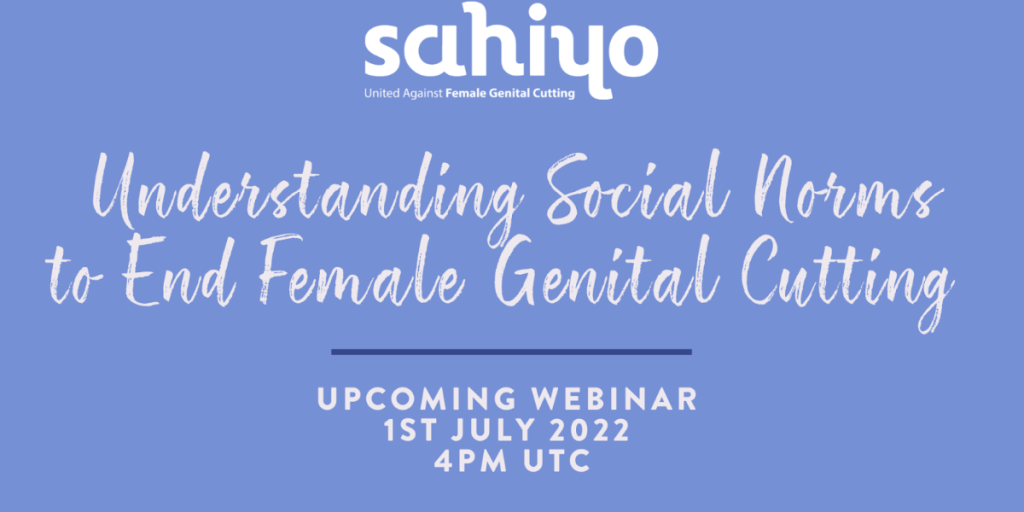
À propos du webinaire Même si les mutilations génitales féminines (MGF) sont condamnées par de nombreux traités et conventions à l’échelle internationnale, elles continuent d’être pratiquées conformément aux normes sociales. Les normes sociales ont une influence puissante sur les communautés et orientent les comportements, y compris les rôles, les attitudes et les valeurs de genre, qui contribuent au MGF. Le 1 juillet, notre webinaire explorera le MGF en tant que norme sociale. La discussion portera sur la tension communautaire entre les normes sociales et l’activisme du MGF. Ce webinaire réunira un large éventail de voix et donnera aux participants l’occasion de participer à la discussion sur la façon dont nous pouvons tous être mieux éduqués et de meilleurs défenseurs dans le cheminement pour mettre fin au MGF. Les normes sociales sont complexes, mais à mesure qu’elles évoluent, elles peuvent aussi mettre fin au MGF. Notre panel Cet événement sera modéré par la cofondatrice de Sahiyo, Aarefa Johari. Habitante de Mumbai, Aarefa est une activiste contre le MGF. Elle est également une journaliste talentueuse et lauréate du prix Chameli Devi Jain. Concernant nos principales intervenantes invitées, nous sommes ravis d’accueillir Maryan Abdikadir et Molly Melching. Maryan Abdikadir est une survivante et militante contre le MGF. Titulaire de deux maîtrises, Maryan est chercheuse et auteure. Elle a entrepris des programmes d’abandon des MGF et a participé à la rédaction du projet de loi sur l’interdiction des MGF au Kenya. Molly Melching est fondatrice et directrice de la création de l’ONG Tostan. Elle a reçu une reconnaissance internationale pour son travail novateur dans les domaines du changement des normes sociales et de l’éducation aux droits humains. Elle a reçu de nombreux prix, dont le Prix d’alphabétisation du Roi Sejong de l’UNESCO, le Prix Thomas J. Dodd pour la justice et les droits de l’homme, entre autres. Inscrivez-vous au webinaire Comprendre les normes sociales pour mettre fin aux mutilations génitales féminines ici.
Upcoming webinar: Understanding Social Norms to End Female Genital Cutting

About the Webinar Even though Female Genital Cutting (FGC) is condemned by many international treaties and conventions, it continues to be performed in accordance with social norms. Social norms have a powerful influence over communities and guide behaviour, including gender roles, attitudes, and values, which contribute to FGC. On July 1st, our webinar will explore how FGC is a social norm. The discussion will investigate tension between community social norms and the advocacy that occurs around ending FGC. This webinar will bring together a diverse array of voices and give participants the opportunity to be part of the discussion on how we can all become better educated, and better advocates, in the journey to end FGC. Social norms are complex, but as they evolve, so too can they bring about an end to female genital cutting. Our Panel This event will be moderated by Sahiyo co-founder, Aarefa Johari. Based in Mumbai, Aarefa is a Sahiyo co-founder and activist against FGC. She is also a talented journalist and winner of the Chameli Devi Jain Award. For our distinguished guest speakers, we are delighted to have Maryan Abdikadir and Molly Melching. Maryan Abdikadir is a survivor and activist against FGC. Holding two Master’s degrees, Maryan is a researcher and author. She has undertaken FGM abandonment programs and participated in the drafting of the Prohibition of FGM Bill in Kenya. Molly Melching is Founder and Creative Director of Tostan. She has received international recognition for her groundbreaking work in the areas of social norm change and human rights education. She has received numerous awards including: UNESCO’s King Sejong Literacy Prize, The Thomas J. Dodd Award for Justice and Human Rights, among others. Register for the Understanding Social Norms to End Female Genital Cutting webinar here.
